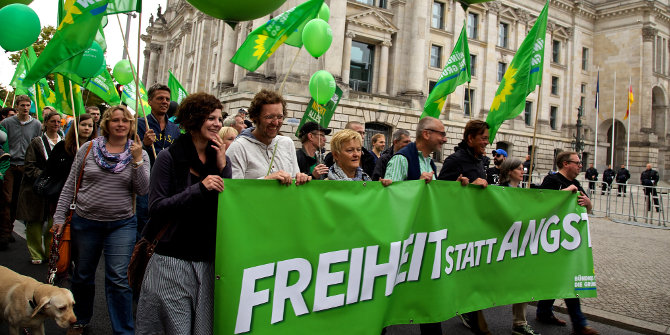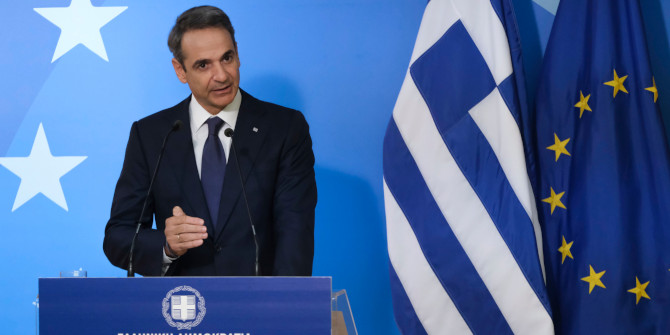 Earlier this month the Czech and Slovak governments criticised the airing of a Russian documentary on the Soviet invasion of Czechoslovakia in 1968, with the Slovak ministry of foreign affairs describing it as an attempt ‘to rewrite history’. Martin D. Brown writes that while the documentary was undoubtedly flawed, the diplomatic spat was symptomatic of a situation in which Russia has increasingly adopted a resolutely Soviet view of history, while post-Soviet states have supported the construction of a consciously anti-Soviet history built around the concept of totalitarianism. He argues that there is little to gain from EU states rewriting their own past simply to counter the Russian narrative.
Earlier this month the Czech and Slovak governments criticised the airing of a Russian documentary on the Soviet invasion of Czechoslovakia in 1968, with the Slovak ministry of foreign affairs describing it as an attempt ‘to rewrite history’. Martin D. Brown writes that while the documentary was undoubtedly flawed, the diplomatic spat was symptomatic of a situation in which Russia has increasingly adopted a resolutely Soviet view of history, while post-Soviet states have supported the construction of a consciously anti-Soviet history built around the concept of totalitarianism. He argues that there is little to gain from EU states rewriting their own past simply to counter the Russian narrative.
David Cameron spoke last week at the 10th GLOBSEC Security Forum, held in Bratislava, Slovakia. He addressed the key security concerns facing Europe: conflict in Ukraine, the rise of ISIL and the flow of migrants crossing the Mediterranean. His speech was clearly aimed at reassuring members of the European Union’s eastern and southern flanks of continued British support. He also stressed the need to find credible policies to combat the menacing appeal of ISIL’s extremist ideology and the radicalisation of Muslim populations across Western Europe.
ISIL is not the first movement attempting to use social (and other) media and revisionist history to buttress its geopolitical strategy. Cameron’s hosts, the Slovaks, and their neighbours in Central and Eastern Europe, have had plenty of experience dealing with extremist ideologies, so it might be presumed they have developed workable solutions to tackle this threat.
Most recently, along with her neighbour the Czech Republic, Slovakia has been embroiled in a diplomatic spat with Moscow over a Russian television documentary about the crushing of the ‘Prague Spring’ in 1968 – a pivotal moment in the history of one of the preeminent extremist ideologies in European history: communism. There’s nothing surprising in this: the twentieth century is a vigorously contested subject. The past has regularly been weaponised in propaganda wars over ‘historical truth’. Even the Cold War has been persistently, and inaccurately, press-ganged into service with reference to the current conflict in Ukraine.
Russia appears to be reverting to a resolutely Soviet view of history, whereas the post-Soviet states have supported the construction of a consciously anti-Soviet history built around the concept of totalitarianism. The two narratives are incompatible, and it’s questionable whether either encourages a useful dialogue or tells us much about history’s ability to proffer policy recommendations.
The battle for history
This particular incident was triggered by a new series on Russia’s Rossiya-1: Warsaw Pact – Pages Declassified. The programme defended the Pact’s invasion of Czechoslovakia in 1968 (involving Bulgarian, East German, Hungarian, Polish and Soviet forces), claiming it was a pre-emptive intervention to avoid a NATO/Nazi-led putsch. Outraged, both Bratislava and Prague made formal complaints to Russia for allowing such distortions to be broadcast.

Rossiya’s claims are nonsense: a crude rehashing of old Soviet justifications. We now know from oral testimonies that similar stories were fed to Warsaw Pact troops crossing the Czechoslovak borders, who were surprised at the hostile reception they received. More nuanced accounts can be found in various articles, books and document collections that conclusively demonstrate the falsehood of Rossiya’s claims.
So, on the face of it, this was another example of Vladimir Putin’s attempts to manipulate the Russian/Soviet past for political gain in the ongoing information war with the ‘West’. Perhaps it’s also symptomatic of Russia’s concerns over western-sponsored ‘colour revolutions’ and regime change. But this is only half the story.
For the past twenty-five years, post-Soviet Europe has also been busily reclaiming and rewriting its history. During the communist era the past was strictly policed and heavily censored. Public discussion of human rights abuses, political repression, and the murder of tens of millions was suppressed. Well-known examples include the official obfuscation over the Ukrainian famine, the Molotov-Ribbentrop Pact and the Katyn massacre.
Although the past was confiscated by communist regimes, this does not mean the west’s version was wholly objective or accurate either. All research into the Cold War was politicised, on both sides of the Iron Curtain. Previously established estimates of the death toll under Stalin are currently being revised and reduced.
Since 1989, post-Soviet states have been opening up their archives and enacting legislation to establish institutes to document and publicise these events: the Estonian Institute of Historical Memory; the Terror House in Hungary; the Institute of National Remembrance in Poland; and the Nation’s Memory Institute in Slovakia, grouped together under the umbrella of the Platform of European Memory and Conscience.
Led by the Czech Republic, a campaign was launched in 2008 to formularise these perspectives into the EU itself. A European Day of Remembrance for Victims of Stalinism and Nazism was subsequently established, to be commemorated annually on the 23rd of August.
Collectively, and inspired by a reading of the work of Hannah Arendt (or perhaps a misreading), these bodies and laws promote a state–sponsored conception of totalitarianism, in which the histories and crimes of fascism and communism are expressly equated. The most vocal exponents of this concept in the west are Anne Applebaum and Timothy Snyder.
Controversially, this discourse has also been exposed to attempted efforts at Holocaustization; co-opting the terminology of the extermination of Europe’s Jews. In 2014 the Estonian film In the Crosswind, dealing with the mass deportations of 1941, expressly used the term “Soviet Holocaust”. Again, the purpose being to equate what is argued are the lesser-known communist crimes with those of the Nazis.
Entirely justifiably, these post-Soviet countries are reclaiming their long lost pasts. However, their politicians have constructed and funded bodies to produce an ‘approved’ totalitarian version of history diametrically opposed to the former communist narrative. Regardless of what one might think of the usefulness of such an approach, the official nature of the programme should give one pause for thought. History is about discourse and any process that limits or hinders debate should be a source of concern.
Treated with care, and protected from political interference or national sentiment, such an approach should yield useful results. But as Dr Muriel Blaive, Advisor to the Director for Research and Methodology at the Institute for the Study of Totalitarian Regimes in Prague, warned in a recent interview, this hasn’t always been the case. There have been wide discrepancies in how well these communist-era archives have been protected and utilised, as well as in the outcomes produced.
I would argue that the central problem is not with what the totalitarian approach claims to have revealed, but rather with what it has failed to explain. Yes, the crimes of communism have now been documented and rightly exposed, but what exactly has been revealed about the comparison with fascism, especially in those states that actively engaged with both? It’s difficult to see how the lumping together of disparate regimes is an aid to analysis, especially as the concept of totalitarianism remains at best fuzzy and ill-defined.
Furthermore, the totalitarian approach is avowedly Euro-centric and geographically myopic. It offers no insight into the global Cold War, and it ignores the fact that, outside of Europe, Moscow was often regarded as the champion in the anti-imperialist struggle.
More problematically the project has failed to explain why tens, if not hundreds, of millions of people willingly joined fascist and communist parties in the first place or later collaborated with these regimes. Were they deluded, coerced, or, more worryingly, did they actively embrace the ideologies on offer? We have no answer.
Put bluntly, the opposite of communist lies is not ‘truth’. Nor does Russia have a monopoly on falsifying the past. The issue here, as Cameron addressed in Bratislava, is how societies comprehend and confront ideological extremism, be it fascism, communism, or the current rise in violent Islamic fundamentalism.
More than twenty-five years after the fall of the Berlin wall, what hope does the EU have in confronting the allure of ISIL, if it’s yet to develop a sophisticated and holistic understanding of its own history of extremist ideology?
Please read our comments policy before commenting.
Note: This article gives the views of the author, and not the position of EUROPP – European Politics and Policy, nor of the London School of Economics.
Shortened URL for this post: http://bit.ly/1CtABj6
_________________________________
 Martin D. Brown – Richmond, the American International University in London
Martin D. Brown – Richmond, the American International University in London
Martin D. Brown is an Associate Professor of International History at Richmond, the American International University in London. He is co-editor of Slovakia in History (Cambridge University Press, 2011) and author of Dealing with Democrats. The British Foreign Office’s relations with the Czechoslovak émigrés in Great Britain, 1939-1945 (Peter Lang, 2006). His research focuses on European diplomatic history, Cold War historiography and British engagement with the Helsinki Final Act of 1975.





A very good piece – although the author could have quoted someone more authoritative than Cameron (in terms of historical studies), especially at the end of the article.
I was citing Cameron as an authoritative voice in the formation of British, European and NATO policy rather than as a historian
Thank you for an interesting reading. Unfortunately not much to agree with. The author seems to want to diminish the whole concept of looking into the crimes of communism, hinting as if it would be something of an interest only to the former Soviet republics, who “want to rewrite history” (a term that is so often used by Kremlin and its propaganda machine). This approach is rather worrying.
Nor is it possible to agree that the crimes of communism have been revealed. So much remains to be done, to say the least. Investigating, acknowledging and remembering the crimes of totalitarian regimes is ever more relevant today when Russian government is trying to exculpate the crimes of communism with huge resources and not only in Russia itself (think of RT) and not only on this topic. The effects are worrying (e.g. compare 2013 and 2015 results about image of Stalin among Russians: http://www.themoscowtimes.com/news/article/was-stalins-terror-justified-poll-shows-more-russians-think-it-was/518298.html)
The purely academic critic on some weaknesses of the totalitarianism as a theory are rather not relevant when so many in Europe and in the World still don’t know (or simply do not want to know) about the crimes of communism, because the truth so often is uncomfortable.
A good balance after reading Assoc Prof Brown’s piece, is exactly something from Applebaum or Snyder. For instance http://www.nybooks.com/articles/archives/2011/mar/10/hitler-vs-stalin-who-killed-more/ Hopefully the author doesn’t mind.
No, I am sure you didn’t find much to agree with, and that’s the point of a discourse, and indeed the point of my piece